Story and photos by Joe Greeves
While a lot of car guys claim that “old guys rule,” others let their
rides do the talking. Just ask Gary Wolcott, who has been building cars
since his teens, and is now in his golden years. Early on, his projects
consisted of mild customizing and de-chroming, but soon expanded to
upgraded horsepower and engine conversions. But he didn’t do any serious
body mods until about 20 years ago, self-taught and learning through
trial and error.
Chopping the tops on a ’49 Chevy pickup and a ’48 Caddy Sedanette
turned out well, followed by a modified ’32 Ford roadster and ’39
Lincoln Zephyr coupe. While those rides were fun, he always wanted to do
an old-school lead sled and was specifically intrigued with the idea of
a sectioned Ford Shoebox.
When it was time to begin in earnest, he found a funky 1951 Vicky
hardtop in North Carolina and hauled it to his home in Seffner, Florida.
He felt it was better to start out with something rough in case he
ruined it. But as evident in the photos, there was no need to worry.
“After four years and a lot of mistakes, it didn’t turn out too bad,”
Gary says — but with one qualification: “For a backyard, first-attempt
section job.”
In fact, sectioning was just one of many metalworking techniques
that he applied to the Ford. The process actually began by creating a
firm foundation. The Z’d and notched S-10 subframe uses the factory
front end, and incorporates a four-bar suspension in the rear. Chevy
Blazer disc brakes handle stopping chores, while the Goodyear air bags
on all four corners provide an altitude adjustment. Even though the air
suspension brought the old ‘Box down, removing 4 inches from the top and
5.5 inches from the body brought it down even more.
With an eye toward establishing the correct long and low proportions,
he shortened the roof 10 inches, and the three-piece Vicky rear window
was replaced with metal and glass from a coupe. He also extended the
rear deck and modified the rear quarter panels to accommodate ’56 Olds
tail lights, accented with ’52 Ford trim.
Up front, Gary lengthened the front fenders 3.5 inches and fitted
them with frenched ’53 Mercury headlight rings. After rounding the hood
corners, he designed a smooth, Mercury-style grille shell with a ’54
Chevy front bumper override used as the center bar. Both ends are
protected with ’49 and ’50 Ford bumpers, with a ’55 Pontiac rear bumper
override used out back. Exhaust tips exit through the rear bumper.
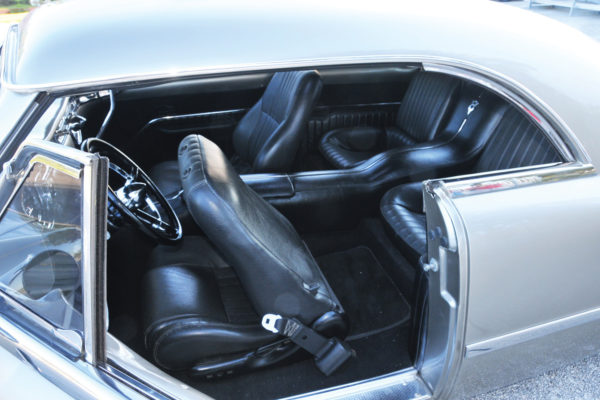
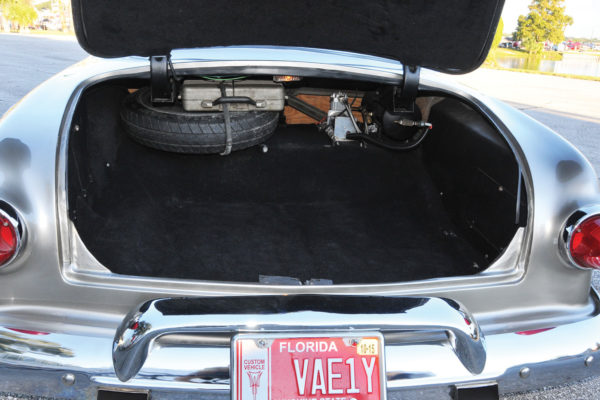
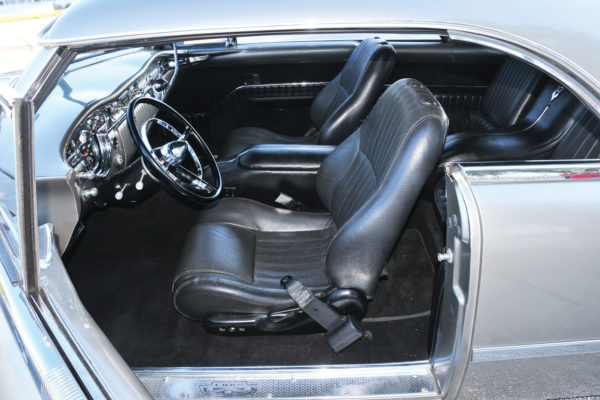
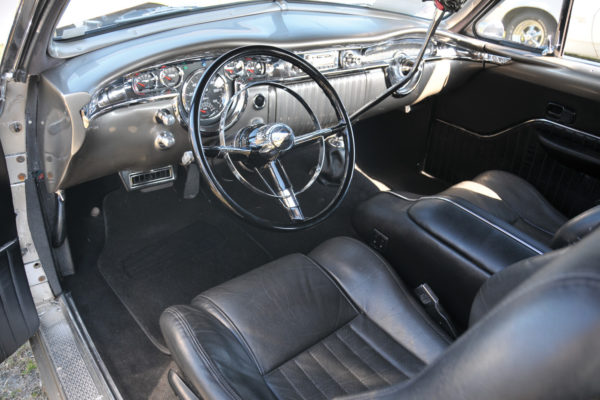
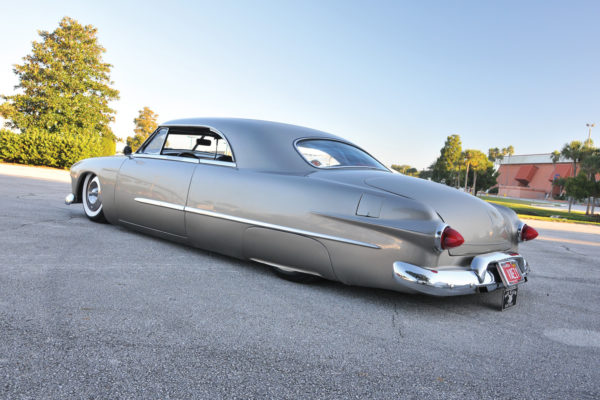
A few final exterior touches include shaving the door handles,
fabricating flush-mounted fender skirts that hide the rear tires, and
applying ’55 Chevy 210 side trim as a style line. The car rolls on Chevy
Blazer 7 x 50 rims, wrapped in 70-Series Diamond Back whitewalls and
highlighted with ’53 Caddy hubcaps. While the staggering number of body modifications would challenge a
full-time professional, Gary’s backyard build was just hitting its
stride over a four-year period. The black leather and vinyl interior
sports a custom fiberglass headliner along with a modified ’55 Olds dash
with AutoMeter gauges. He sourced the seats from an ’02 Trans Am,
separated by a custom-made fiberglass center console that waterfalls
from the rear seats to the dash.The cut-down’55 Chevy steering wheel actuates a modified rack and
pinion, also from a ’55 Chevy. Creature comforts inside include power
windows, Vintage Air, and a Custom Autosound radio. Motive power and paint were the final steps, with Gary choosing an GM
LS1 V8, supplying plenty of beans in stock form. While a Blue Oval
engine was his initial choice, he discovered that the Ford mill was too
tall for the sectioned engine compartment. And Gary has a soft spot for
the General’s mechanicals since, “They are plentiful, reasonably priced,
and hold up well,” he feels. Power from the LS1 flows through a 4L60E transmission with a
tall Lokar shifter. For the appropriate performance rumble, Gary custom
fabricated exhaust manifolds and the system is quieted (almost) by a set
of Smithy’s Glasspacks. The final step was paint and Gary sprayed the car himself (who else?), choosing PPG Light Metallic Pewter. Has the car been a success? Judging by the fact that it was a
Goodguys Builders Choice and a George Barris Best of Show, we’d say
that’s affirmative. Is Gary eager to build another award-winning custom?
Well, yes and no. “My next project is a ’51 Studebaker Business Coupe with a new Ford
Coyote motor. The only body modification is the installation of a ’50
Ford dash. I think I’ve had my fill of metal fabrication for a while.”
After all, he sure doesn’t have to prove that old guys rule.
Power from the LS1 flows through a 4L60E transmission with a
tall Lokar shifter. For the appropriate performance rumble, Gary custom
fabricated exhaust manifolds and the system is quieted (almost) by a set
of Smithy’s Glasspacks.
The final step was paint and Gary sprayed the car himself (who else?), choosing PPG Light Metallic Pewter.
Has the car been a success? Judging by the fact that it was a
Goodguys Builders Choice and a George Barris Best of Show, we’d say
that’s affirmative. Is Gary eager to build another award-winning custom?
Well, yes and no.
“My next project is a ’51 Studebaker Business Coupe with a new Ford
Coyote motor. The only body modification is the installation of a ’50
Ford dash. I think I’ve had my fill of metal fabrication for a while.”
After all, he sure doesn’t have to prove that old guys rule.
A few final exterior touches include shaving the door handles,
fabricating flush-mounted fender skirts that hide the rear tires, and
applying ’55 Chevy 210 side trim as a style line. The car rolls on Chevy
Blazer 7 x 50 rims, wrapped in 70-Series Diamond Back whitewalls and
highlighted with ’53 Caddy hubcaps.
While the staggering number of body modifications would challenge a
full-time professional, Gary’s backyard build was just hitting its
stride over a four-year period. The black leather and vinyl interior
sports a custom fiberglass headliner along with a modified ’55 Olds dash
with AutoMeter gauges. He sourced the seats from an ’02 Trans Am,
separated by a custom-made fiberglass center console that waterfalls
from the rear seats to the dash.
The cut-down’55 Chevy steering wheel actuates a modified rack and
pinion, also from a ’55 Chevy. Creature comforts inside include power
windows, Vintage Air, and a Custom Autosound radio.
Motive power and paint were the final steps, with Gary choosing an GM
LS1 V8, supplying plenty of beans in stock form. While a Blue Oval
engine was his initial choice, he discovered that the Ford mill was too
tall for the sectioned engine compartment. And Gary has a soft spot for
the General’s mechanicals since, “They are plentiful, reasonably priced,
and hold up well,” he feels.
A few final exterior touches include shaving the door handles,
fabricating flush-mounted fender skirts that hide the rear tires, and
applying ’55 Chevy 210 side trim as a style line. The car rolls on Chevy
Blazer 7 x 50 rims, wrapped in 70-Series Diamond Back whitewalls and
highlighted with ’53 Caddy hubcaps.
While the staggering number of body modifications would challenge a
full-time professional, Gary’s backyard build was just hitting its
stride over a four-year period. The black leather and vinyl interior
sports a custom fiberglass headliner along with a modified ’55 Olds dash
with AutoMeter gauges. He sourced the seats from an ’02 Trans Am,
separated by a custom-made fiberglass center console that waterfalls
from the rear seats to the dash.
The cut-down’55 Chevy steering wheel actuates a modified rack and
pinion, also from a ’55 Chevy. Creature comforts inside include power
windows, Vintage Air, and a Custom Autosound radio.
Motive power and paint were the final steps, with Gary choosing an GM
LS1 V8, supplying plenty of beans in stock form. While a Blue Oval
engine was his initial choice, he discovered that the Ford mill was too
tall for the sectioned engine compartment. And Gary has a soft spot for
the General’s mechanicals since, “They are plentiful, reasonably priced,
and hold up well,” he feels.






















No comments:
Post a Comment